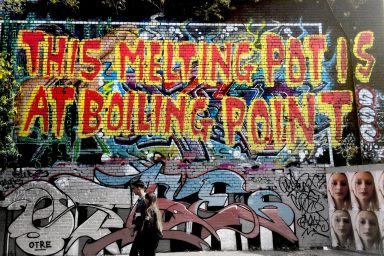NOW LIVE ON WhoWhatWhy
The Radical Experiment in Democracy That Defeated the Islamic State in Syria by Victor Kotsev
The American allies that beat back a five-month Islamic State onslaught on the Syria-Turkey border are running a bold experiment in democracy started by … terrorists. From Istanbul, Victor Kotsev examines the Kurdish warrior-democrats doing Washington’s heavy lifting.
WHO
Obama Is Pursuing Regime Change in Israel
Bibi’s getting some blowback. David Aaron Miller reports that the Administration is making it displeasure over his forthcoming speech known in D.C. and Tel Aviv. They’re lobbying Democratic members of Congress to boycott the speech. And the Administration is leveraging a growing sense in Israel that Bibi bungled the situation, unnecessarily opening a rift with Israel’s strongest ally. With the March 17 Israeli election approaching fast, the White House’s strategic refusal to meet Netanyahu stands in stark contrast to its scheduled meeting with Bibi’s Labor party rival, Isaac Herzog. And informal meetings at the Munich Security Conference between Herzog, VP Joe Biden and Secretary John Kerry made big news back home in Israel. As Miller points out, this type of politicking has had mixed results in the past. But there’s little doubt Obama will do everything short of running ads make certain Bibi’s speech before Congress is his last.
Daniel Ortega Goes From U.S. Foe to Friend in Drug War Battle
In an amazing twist, one of America’s biggest bogeymen from the 1980s—Sandinista leader Daniel Ortega—is accepting material support from the United States to help Nicaragua fight drug trafficking. Not only did the U.S. send equipment, but it also trained the Nicaraguan navy and the U.S. Navy provided support for Nicaragua’s “Christmas Without Drugs” operation in December. Although now-President Ortega still rails against “the Yankee,” the cooperation is part of his plan for continued economic growth (4% last year). He believes that hinges on keeping drug gangs out and maintaining the lowest murder rate in Central America. That goal is lining up with his former enemy’s effort to stop the violence fueling migration to the U.S. And it has Ronnie spinning in his grave.
As the US Mission Winds Down, Afghan Insurgency Grows More Complex
It’s a tale of two headlines today on the topic of Afghanistan. This story in the Washington Post details the factionalization of the Taliban into two groups—the familiar Taliban in the south and a more “moderate” offshoot in the north that allows girls to go to school and eschews beheadings. But while this story highlights waning U.S. and NATO efforts in “an unfinished conflict,” The New York Times ran a story under the headline “US is Escalating a Secretive War in Afghanistan.” It details the increasing tempo of raids by U.S. forces. This “unprecedented” spike in military action is “at odds with policy declarations in Washington, where the Obama administration has deemed the American role in the war essentially over.” And, as if on cue, nine were killed and many others injured in a drone strike in Afghanistan’s Nangarhar Province on Wednesday.
WHAT
Study Finds Rising Levels of Plastics in Oceans
A new study in the journal Science is the “most ambitious effort yet” to quantify the amount of plastic that ends up polluting the world’s oceans. The actual number is hard to pin down. But researchers estimate that we added somewhere between 4.8 million and 12.7 million metric tons of plastic to the world’s oceans in 2010. That’s roughly 1.5% to 4.5% of the total produced worldwide and a huge increase from the 0.1% estimated in 1975. The degrading plastic—which often breaks down into smaller and smaller pieces—is also being traced through the food chain and affecting entire ecosystems. The study also identifies the world’s top plastic polluters. China is number one with 3.5 million metric tons discarded into the oceans annually. The U.S. came in 20th place with a “mere” 110,000 metric tons.
WHY
Mass Incarceration Does Not Explain Dramatic Fall in US Crime, Study Finds
Why has violent crime dropped 50% and property crime dropped 43% since 1990? Advocates of incarceration point to the swollen prison population as a factor. More criminals in jail means less crime, goes their logic. But researchers at the Brennan Center for Justice concluded that the rising prison population had “a negligible effect on the downward trend in crime, with mass incarceration responsible for around 6% of property crime reduction in the 1990s and less than a single percentage point in the 2000s.” Although the study couldn’t pinpoint all the factors leading to the drop in crime, it did cite advances in the acquisition and use of crime data as “a significant factor in crime reduction in certain cities.”
Dinosaurs May Have Been Tripping on Hallucinogens
A new joint study from Oregon State University and the USDA Agricultural Research Service has found that dinosaurs were probably trippin’ out. That’s because the largest land animals in history ate lots of grass which hosted a version of the fungus responsible for LSD. The fungus, know as ergot, is found on rye and wheat grasses, among others. When humans eat it, it can cause hallucinations, delirium, gangrene and convulsions. Scientists, who found grass remains in fossilized feces, postulate that dinosaurs may have suffered some of the same effects as, say, the folks who organized the Salem Witch Trials or started the French Revolution. Many historians believe those events were triggered by people eating ergot-tainted bread. Imagine what it did to disgruntled brontosauruses!
Sign Up
Like what you see? Sign up to subscribe.
